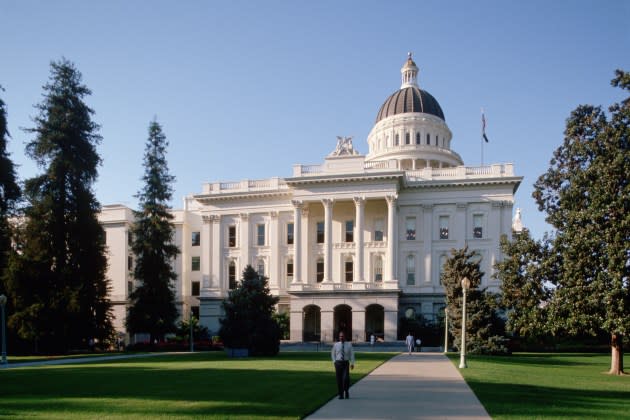Bill Backed By WGA & SAG-AFTRA To Give Unemployment Insurance To Striking Workers In California Clears Labor Committee; Now Heads To Full State Senate
- Oops!Something went wrong.Please try again later.

A bill that would make striking workers in California eligible to receive unemployment benefits was approved on Wednesday by a 4-1 vote of the state Senate’s Labor, Public Employment and Retirement Committee. Senate Bill 799, which has already been passed by the state Assembly, now goes to a vote of the full Senate. If approved there, it will be up to Governor Gavin Newsom to either sign it into law or veto it. Last year, he vetoed 169 bills while signing nearly 1,000.
The WGA has been on strike since May 2, and SAG-AFTRA since July 14, but the bill would extend unemployment benefit coverage to all striking workers in the state, not just writers and actors. In 2019, a similar bill failed in the Senate by just two votes. Strikers in New York and New Jersey are entitled to collect unemployment benefits after two weeks on the picket line, but those in California currently aren’t eligible because they’re considered to have left their jobs “voluntarily.”
More from Deadline
Fran Drescher Slams "Greedy" Studio CEOs ; Want To "Keep Us Their Peons," SAG-AFTRA Prez Says
SAG-AFTRA Interim Agreements: Full List Of Movies And TV Series
During today’s committee hearing, the bill was supported by representatives of the WGA, SAG-AFTRA, IATSE, Actors’ Equity and numerous unions across the state who said that unemployment benefits are a much-needed “safety net” for workers during strikes.
See the hearing here.
At today’s hearing, a WGA West rep read a statement in support of the bill from the guild’s president, Meredith Stiehm, who told the Assembly’s Insurance Committee last month that “Writers have had to rely on strike loans from our union, donations, philanthropy, and second and third jobs to pay for their basic needs since May 2. Four months without work is emotionally brutal and financially disastrous. I’m proud to report that our members have held strong and kept their resolve throughout this long hot labor summer, but they are suffering.”
SAG-AFTRA Secretary-Treasurer Joely Fisher, who also testified last month in Sacramento, told the Assembly Insurance Committee that “Denying UI to striking workers is another way employers hold an unfair advantage over workers fighting for what’s right. CEOs play the waiting game, knowing workers living on the margins have rent to pay and groceries to buy. SB 799 gives workers a chance to fight for what’s fair. We are in the fight of our lives – for our jobs, our industry, our future. We cannot wait any longer for UI benefits that will help us survive and will help all workers who stand up to fight for a better future.”
During Wednesday’s hearing, SB 799 was opposed by the numerous employer groups, including the California Chamber of Commerce, whose representative described it as “a job killer” that puts the state’s resources on the side of striking unions. He also argued that the bill will likely lead to increased unemployment insurance taxes on employers, while noting that the state’s unemployment insurance fund is already $18 billion in debt and that the bill would add about $2 billion to that debt over the next 10 years.
The Alliance of Motion Picture and Television Producers, against whose member-companies the WGA and SAG-AFTRA are striking, has not taken a position on the bill.
Sen. Dave Cortese, who chairs the committee, and Sen. Anthony Portantino, who authored the bill, acknowledged that the state’s unemployment insurance fund is underfunded, but noted that the money it pays out not only helps striking workers and their families, but also goes right back into local economies and businesses, including those that oppose the bill’s passage.
SB 799 has also received the backing of U.S. House Speaker Emerita Nancy Pelosi; Lieutenant Governor Eleni Kounalakis; state Treasurer Fiona Ma; Insurance Commissioner Ricardo Lara; State Superintendent of Instruction Tony Thurmond; and U.S. Senate candidates Rep. Adam Schiff, Rep. Katie Porter and Rep. Barbara Lee.
At the end of today’s hearing, Cortese voted in favor of the bill, as did fellow Democrats María Elena Durazo, John Laird and Lola Smallwood-Cuevas. Only Sen. Scott Wilk, a Republican who is the committee’s vice chair, voted against it.
Best of Deadline
SAG-AFTRA Interim Agreements: Full List Of Movies And TV Series
2023 Premiere Dates For New & Returning Series On Broadcast, Cable & Streaming
Sign up for Deadline's Newsletter. For the latest news, follow us on Facebook, Twitter, and Instagram.

